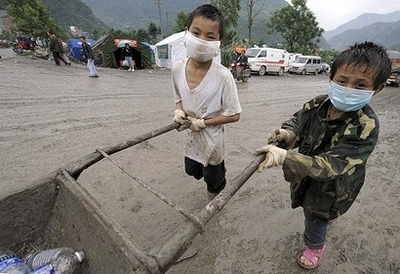China probes schools, fights quake lakes
(China Daily/Xinhua/Agencies)
Updated: 2008-05-30 07:30
Updated: 2008-05-30 07:30
The two have joined others who have been coming for several days to one of dozens of demolished sites around town, after hearing that local salvage companies would pay about 7 cents for each pound of metal.
At the same site was Li Hongshen, a 52-year-old janitor, who was swinging a crude pickax to crush blocks of concrete to extract the scrap metal.
|
Young boys pull a cart with garbage for recycling at a temporary shelter in Leigu town in Beichuan county in China's southwestern province of Sichuan. [Agencies] |
"There's no other way to make money," he said, shrugging almost apologetically. "I feel a little bit guilty because so many people died here but I have my family to support."
He is caring for his wife, two daughters and an elderly mother. Their home collapsed during the quake, and they are living in a makeshift lean-to made of plastic tarp and wooden boards near the side of the road.
"What the government gives us is enough," he said, referring to the regular rations of bottled water, instant noodles, and biscuits given out by aid workers. "But food and water aren't everything in life. In the future, we need to rebuild our homes and that takes money."
Fellow survivors have discovered other quake-related, albeit dangerous, ways to earn hard cash.
Burly and bearded, farmer Lin Cenyou, 38, was taking a break from his new job — venturing into badly damaged buildings to haul out the belongings of other refugees.
"They tell me what they want and I go get it," he said with a nonchalance that belies his precarious new profession. "It's a little dangerous but I don't fear anything now. I just need money to feed my family."
Scores of aftershocks have rumbled across the disaster zone, collapsing thousands of buildings. At least eight people have been killed in buildings that fell since the quake, state media have reported.
Lin, who lives in a mountain village an hour's hike away, heads into Qingchuan at 5:30 a.m. each day, offering his muscles for cash. He can make up to $7 a day retrieving furniture, TVs and appliances, well worth the risk, he said.
Still, he has had a couple of close calls. Lin rolled up his sleeves and pants to show bruises and scratches on his arms and legs. Earlier this week, a powerful aftershock in Qingchuan sent a chunk of a plaster falling on him as he was inside an apartment building.
"What else can I do?" he said. "I have no choice now. I am a farmer with nothing left to farm."
On a crowded street near scores of blue refugee tents, a handful of mom-and-pop merchants lucky enough to salvage their wares set their goods on display — bags of spices, bottles of soft drinks, bunches of dried noodles.
Customers are scarce but the vendors say even a small sale helps.
Vegetable seller Zhou Xiaomei, 30, got a loan from her regular suppliers in a nearby city and received half a truckload of fresh produce this week that she displayed on the sidewalk — plump eggplant, piles of crisp green peppers, ripe tomatoes and mounds of pungent garlic.
The day before, an old man picked out $6 worth of vegetables, even though he had only about 14 cents with him, she said.
"We gave it to him anyway," said Zhou, who added that she lost everything in the quake except the clothes in which she ran out of the house.
"They try to pay what they can. Now is not the time for business. We need to help each other," she said.
|
||
|
||
|
|
|
|


